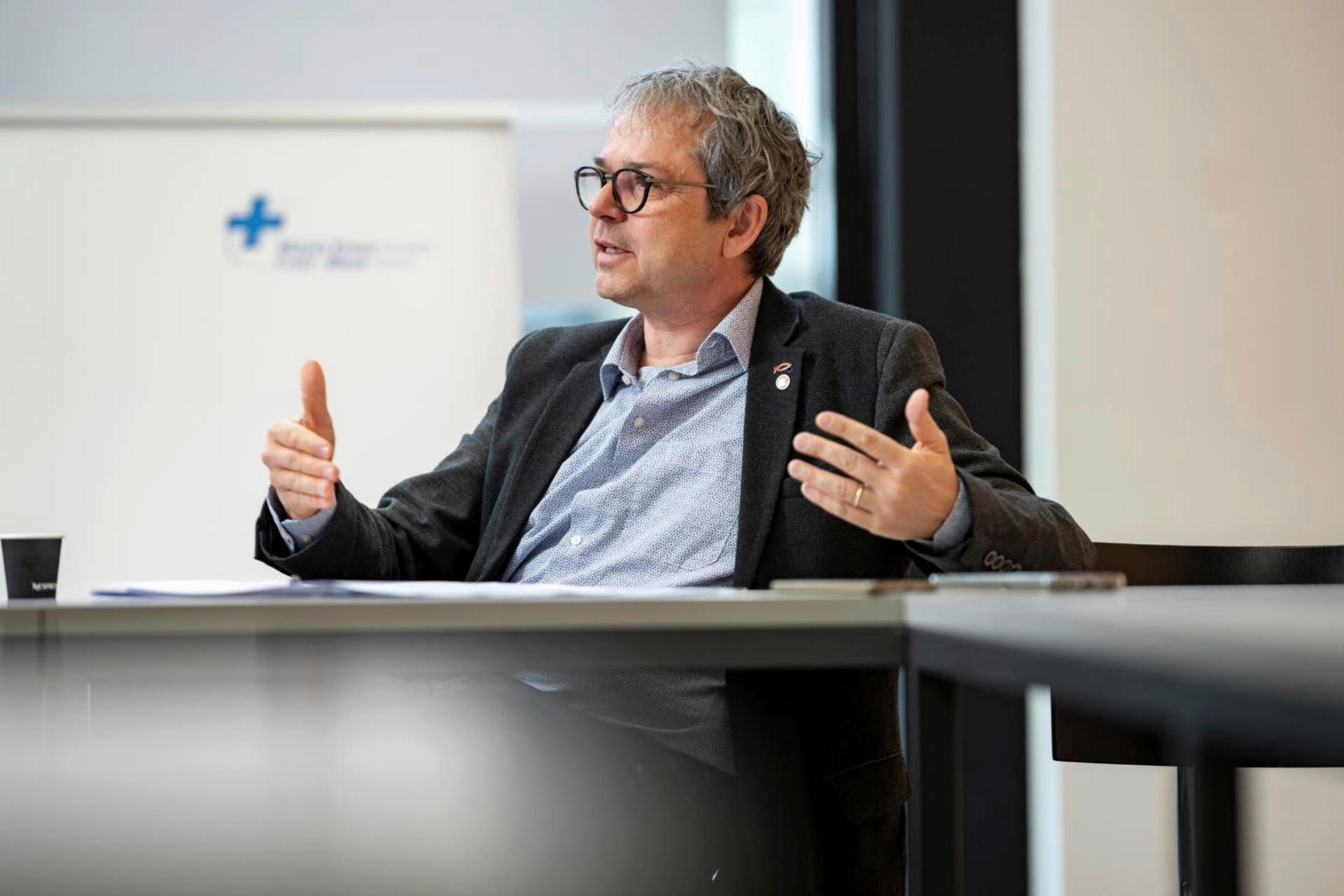
Food waste
Saving food and helping people
A visit to "Tischlein deck dich": members of the FMC Executive Board support the team on site.
navigation

Alcohol vote
Philipp Hadorn says that many people who are at risk of addiction rely on Migros' «alcohol-free island». The President of Blue Cross Switzerland warns against underestimating the socio-economic consequences of alcohol abuse.
No, not at all. Even when I was growing up, alcohol was never drunk at home. My father had reservations about it. Although that wasn't what convinced me, I was never really particularly interested in alcohol. As a teenager, it would annoy me when people urged me to drink with them. I didn't want to be told what to do.
Although faith is a resource for me, it has nothing to do with the discussion about alcohol. It probably only influences the way I deal with people in need. I don't believe that alcohol generates any added value. However, if water were to be turned into wine, I might take a sip again (laughs).
Many of the members of the Blue Cross greatly appreciate this unique selling point of Migros. Sure, most people keep their consumption under control. But there are more than a quarter of a million alcoholics in Switzerland, and many more are at risk of addiction. They rely on Migros' alcohol-free island.
I know many addicts who have been through therapy. These are long and often sad stories. Those affected have paid a high price, sometimes losing their family, friends and job. Most of them have to give up alcohol completely in order to prevent relapsing. These are tricky situations. The temptation to buy alcohol when the opportunity presents itself is very great. At the same time, our ability to control ourselves is limited when we have cravings. When alcoholics find themselves overwhelmed, they reach for alcohol if it's on shelves and so readily available. Migros doesn't only have 630 supermarkets. It also has 235 restaurants and takeaways that are an important «safe space» for alcoholics and those at risk of addiction.
«Yes, Migros currently also conducts alcohol prevention.»
If Migros were to introduce the sale of alcohol, it would become more visible and advertising would increase. I hope that this wouldn't lead to a rise in consumption. However, the downward trend could flatten out or be slowed down. Despite the decline in consumption, alcohol addiction remains a significant problem that causes economic damage totalling CHF 2.8 billion a year. This vote may perhaps lead to people debating alcohol once more and realising just what this addiction means for society.
This isn't about regulatory intervention. We don't live in a culture of prohibition. It's about a company voluntarily deciding not to sell something and giving up this added value. We don't want to ban everything. Nor do we want to be killjoys. The fact that Migros doesn't sell alcohol is the unique selling point we want to uphold. What's more, we have changed as a society with regard to products like sugar and become more aware of the impact of excessive consumption.
That's true. I have three adult sons. None of them would dream of getting behind the wheel of a car after drinking alcohol. There has been a cultural shift. The efforts to raise awareness as well preventative initiatives have worked. Nevertheless, there is still a remarkably high number of people who have an unhealthy relationship with alcohol. One in every 12 deaths among 15-74-year-olds can be attributed to alcohol dependency. Alcohol addiction not only places a great strain on those directly affected, but also on those around them in their private and working lives. We all probably have a friend or relative who has a problem with alcohol.
Migros can't eradicate the problem of alcoholism on its own. However, it makes a significant contribution. It would be a shame if this were to be lost. I also say that as a «child of Migros».
Preventive measures can target the behaviour of individuals or society as a whole. Individual bans can worsen the situation, as demonstrated by the prohibition of alcohol in the US. However, less advertising, higher prices and not having constant availability all bring consumption down to a reasonable level and prevent much suffering. In parallel to this, we can also strengthen people's character. It's not about generally preventing or minimising dangers. Young people in particular must be helped to lead self-determined lives so that they know what they want.
The positioning. Is it about offering special and regional products or simply a way to boost sales? Where alcohol is placed within stores would also play an important role. However, we're not there yet. The cooperative members can now determine the future. I will also be voting.
Philipp Hadorn (55) has been the President of the Blue Cross Switzerland for the past nine years. The organisation's 270 specialist employees and more than 1000 volunteers promote alcohol prevention and provide counselling and care. Hadorn completed a commercial apprenticeship in the watch industry, studied law, was an SP National Councillor and is the Secretary-General of the Swiss Transport Workers' Union (SEV). Hadorn is married and has three sons. He lives in Gerlafingen in Solothurn canton.